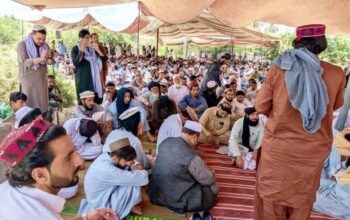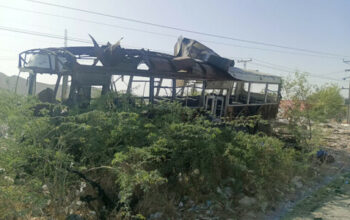By Staff Reporter
ISLAMABAD: Prime Minister Shehbaz Sharif is pushing for dialogue with India to resolve long-standing disputes, proposing Saudi Arabia as a neutral venue for talks amid persistent tensions between the nuclear-armed neighbours.
Sharif, speaking to a group of television anchors at the Prime Minister’s House on Wednesday, emphasised the need for direct talks with India to tackle Kashmir, water, trade, and terrorism, issues that have long strained relations. “Kashmir, water, trade, and terrorism will be the key points during the dialogue with India,” Sharif said.
He dismissed the idea of China hosting talks, noting that “India would never agree to that,” but expressed hope that Saudi Arabia could serve as a third-party venue acceptable to both sides.
The call for talks follows a violent escalation sparked by a deadly April 22 attack in occupied Kashmir, where 26 tourists were killed. India pointed the finger at Pakistan, accusing it of orchestrating the assault, a charge Islamabad vehemently denied, demanding an international investigation.
The incident triggered Indian airstrikes on Pakistani cities, met with reprisals from Pakistan, until a U.S.-brokered ceasefire took effect on May 10. Announcing the truce, U.S. Secretary of State Marco Rubio said, “The Governments of India and Pakistan have agreed to an immediate ceasefire and to start talks on a broad set of issues at a neutral site.”
Sharif’s nod to Saudi Arabia as a venue reflects the kingdom’s growing interest in mediating between the two rivals. Saudi Foreign Minister Adel al-Jubeir visited both nations on May 6—the same day India launched its strikes on Pakistan—hinting at Riyadh’s readiness to step in. Though a longtime ally of Pakistan, Saudi Arabia’s neutrality in this context could appeal to both sides.
Pakistan has welcomed such mediation efforts, with Islamabad previously praising “President Trump’s expressed willingness to support efforts aimed at the resolution of the Jammu and Kashmir dispute—a longstanding issue that has serious implications for peace and security in South Asia and beyond.”
India, however, is unwilling to take any step to defuse the regional standoff. New Delhi insists that any dialogue must center solely on dismantling Pakistan’s alleged terrorist networks and the return of Azad Kashmir, the Pakistani-administered portion of the contested region. India has consistently opposed third-party involvement in the Kashmir dispute, viewing it as a bilateral matter—a stance that casts doubt on its willingness to accept Saudi mediation.
Pakistan Peoples Party (PPP) Chairman Bilawal Bhutto Zardari has sounded the alarm on the broader implications of the standoff.
Speaking to reporters after a briefing at the Ministry of Foreign Affairs, he warned that peace in South Asia remains elusive without resolving three pivotal issues: Kashmir, water, and terrorism.
“A nuclear confrontation between India and Pakistan will have devastating consequences for the entire region and beyond,” he said. “People of both countries seek peace, which is not possible until the three main issues—Kashmir, terrorism, and water—are resolved.”
Bhutto Zardari, a former foreign minister, is gearing up to lead a high-profile diplomatic delegation to key world capitals to spotlight Pakistan’s perspective and counter what Islamabad calls “Indian propaganda” in the wake of the recent clashes.
The delegation—featuring heavyweights like Senator Sherry Rehman, Dr. Musadik Malik, Engineer Khurram Dastgir, Hina Rabbani Khar, Faisal Sabzwari, Tehmina Janjua, and former Foreign Secretary Jalil Abbas Jilani—will press Pakistan’s case for peace.
“We will inform foreign governments and people that a conflict between two nuclear countries would have severe consequences beyond the region,” he said, emphasising the global ramifications.
The delegation’s mission follows briefings at the Foreign Office on the ceasefire, Kashmir, terrorism, and India’s alleged violations of the Indus Waters Treaty—a pact governing river-sharing that Bhutto Zardari accused New Delhi of weaponising. “Pakistan is one of the biggest victims of terrorism,” he told reporters, urging the international community to recognise Islamabad’s restraint. “Pakistan was not the aggressor; we only defended ourselves,” he added, commending Sharif’s measured response. “The world is welcoming our stance as we stood with the truth, while India built a narrative on lies and falsehoods.”
India, for its part, is dispatching seven all-party delegations to key allies, including U.N. Security Council members, later this month to present its own narrative on terrorism and rally support for what it calls a “national consensus.” The parallel diplomatic offensives highlight the chasm between the two nations, even as the ceasefire holds.
Bhutto Zardari cautioned that India’s push for a “new normal” of heightened tensions serves neither side. “We have seen how, after a terrorist attack, both countries can come close to a nuclear war,” he said, pointing to the razor-thin margin for error.
Copyright © 2021 Independent Pakistan | All rights reserved




